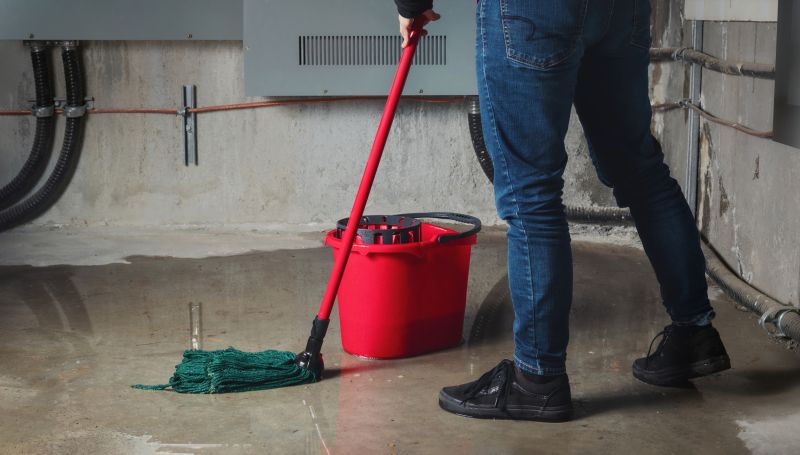Popular Flood Remediation Gear for Homeowners and Professionals
Equip yourself with top flood cleanup supplies that deliver reliable performance during water damage emergencies.
 Flood remediation involves a variety of products designed to mitigate water intrusion and protect property from flood damage. These tools and materials are essential for both immediate response and long-term prevention. From barriers that keep water out to absorbent materials that manage excess moisture, the range of flood remediation products caters to different needs and scenarios. Proper selection and use of these products can help minimize structural damage, protect personal belongings, and ensure safety during flood events.
Flood remediation involves a variety of products designed to mitigate water intrusion and protect property from flood damage. These tools and materials are essential for both immediate response and long-term prevention. From barriers that keep water out to absorbent materials that manage excess moisture, the range of flood remediation products caters to different needs and scenarios. Proper selection and use of these products can help minimize structural damage, protect personal belongings, and ensure safety during flood events.
Top Overall Option
Multi-Use Water Pump System
A versatile water pump system capable of handling various flood scenarios, featuring adjustable flow rates and easy portability. This type of pump can be used to quickly remove standing water from basements, garages, or outdoor areas, making it a valuable tool for flood response and cleanup.
Types of Products For Flood Remediations
Flood Barriers and Shields
Temporary barriers designed to prevent water from entering buildings, available in various sizes and materials.
Sandbags
Traditional and reusable sandbags used to divert or contain floodwaters around structures.
Submersible and Sump Pumps
Electric or battery-powered pumps used to extract water from basements and low-lying areas.
Waterproof Sealants and Coatings
Materials applied to walls and foundations to create a water-resistant barrier.
Drainage Systems and Pipes
Installed to direct water away from properties and reduce flooding risk.
Absorbent Mats and Spill Absorbents
Materials that absorb excess moisture and help dry out affected areas after flooding.
Moisture Meters and Sensors
Devices to monitor water levels and moisture content in walls and floors.
Waterproof Clothing and Gear
Protective apparel for responders working in flooded environments.
Dehumidifiers and Drying Equipment
Devices to remove residual moisture from indoor spaces after flooding.
Flood Vents and Automatic Drainage Devices
Installation components that help prevent water buildup within structures.
Emergency Lighting and Power Supplies
Reliable lighting and backup power for flood response activities.
Water Removal Wands and Squeegees
Tools for manual water removal and surface drying.
Flood Damage Inspection Kits
Tools and kits for assessing structural and water damage post-flood.
Structural Reinforcement Materials
Products used to strengthen vulnerable areas against flood penetration.
Popular Choices
Compact and lightweight pumps favored for quick water removal in various settings.
Reusable barriers that are easy to install and effective for immediate flood defense.
Widely used for basement water removal, with automatic operation features.
Applied to foundations and walls to create a protective barrier against water intrusion.
Commonly installed to direct water away from structures, reducing flood risk.
Effective for cleaning up residual water and moisture after flooding.
Popular for monitoring indoor humidity and water levels after flood events.
Trusted for drying out flooded interiors and preventing mold growth.
Installed to allow water to pass through and reduce internal pressure during floods.
Squeegees and wands used for quick surface water cleanup.
Popular for assessing structural integrity and water damage after floods.
Used to bolster vulnerable areas against water intrusion.
In flood-prone areas, having the right equipment on hand is crucial. Water pumps, sump pumps, and drainage systems are among the primary devices used to remove standing water and reduce saturation levels. Barrier products like flood barriers and sandbags serve as first-line defenses to divert water away from vulnerable areas. Absorbent materials, such as water-absorbing mats and spill absorbents, help clean up residual moisture after the floodwaters recede.
Beyond immediate response tools, there are also long-term solutions like waterproof sealants, drainage systems, and moisture barriers that can be integrated into property infrastructure. These products help prevent water infiltration and reduce the likelihood of mold growth and structural deterioration. Investing in a comprehensive set of flood remediation products can provide peace of mind and preparedness for unpredictable weather events or rising water levels.
Choosing the right flood remediation products depends on various factors, including the severity of potential floods, property type, and budget. Proper training on how to use these products effectively is also essential to maximize their benefits. By understanding the options available, property owners and responders can better equip themselves to handle flood situations efficiently and safely.
Key Buying Considerations
- Assess the severity and frequency of flooding in your area to determine the appropriate products.
- Consider the size and capacity of water pumps to match the expected volume of water to be moved.
- Evaluate the ease of installation and portability of flood barriers and barriers systems.
- Look for durable materials that can withstand repeated use and harsh conditions.
- Check for electrical safety features and certifications in pumps and drying equipment.
- Ensure products are compatible with existing infrastructure, such as drainage systems and walls.
- Review product reviews and ratings for insights into real-world performance.
- Determine the level of maintenance required for each product type.
- Consider budget constraints while prioritizing essential flood response tools.
- Think about storage options for flood products to ensure quick access during emergencies.
- Assess the need for professional installation or training for certain products.
- Choose products with clear instructions and safety guidelines.
- Evaluate the availability of replacement parts or consumables like filters and seals.
- Prioritize products with versatile applications for different flood scenarios.
- Consider long-term solutions that can be integrated into property design for ongoing protection.
This page contains affiliate links. We may earn a commission if you purchase products through these links, which helps support our content without additional cost to you.
